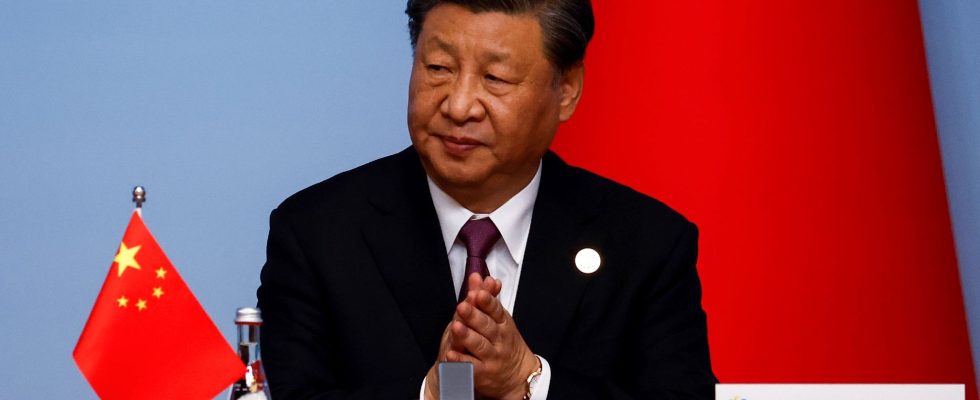The decisions taken in Zhongnanhai, the heart of Chinese power, west of the Forbidden City, are more opaque than ever. It was with a simple sentence on its website last Monday that the Chinese Ministry of Foreign Affairs announced that it would be Premier Li Qiang, and not President Xi Jinping, who would attend the G20 summit on September 9 and 10. , in New Delhi. No explanation has been given for this absence, which adds to that of Vladimir Putin, reclusive in the Kremlin, in the middle of the war in Ukraine.
A little later in the day, the ministry spokesperson was hardly more enlightening, during a press conference, contenting herself with reciting that “China has always attached great importance to the G20 events and took an active part in it.
The best specialists on China are therefore reduced to formulating hypotheses. The subject is far from trivial: it is in fact the first time that the Chinese number one has not participated in this event bringing together the main economies of the planet since he came to power – with the exception of the edition of 2021, in the midst of the Covid epidemic, which he attended by video.
The dream of a Sino-centric international order
This defection goes all the less unnoticed since the Chinese president – at the head of the second largest economic power in the world – was particularly involved a few weeks ago during the last Brics summit (Brazil, Russia, India, China, South Africa). South), from August 22 to 24, in Johannesburg. Very offensive, he won a diplomatic victory, by obtaining the expansion of this club to six new members, including Saudi Arabia, Argentina and Iran.
First possible explanation: the G20 summit would now be less strategic for Beijing. The goal of China’s most powerful leader since Mao is clear: “He seeks to create an alternative to the existing liberal international order, dominated by the United States, a Sino-centric order enjoying broad support from the South.” , summarizes Steve Tsang, director of the SOAS China institute, at the University of London. “Hence the importance of the Brics in relation to the G20, which still operates within the framework of the existing world order,” continues this expert, who believes that the Chinese president could, in addition, be hampered by health problems minors who do not encourage them to travel.
Xi’s cancellation also comes against a backdrop of strong tensions between China and India, linked in particular to a territorial conflict in the Himalayas, which gave rise to deadly clashes in June 2020. Beijing does not has done nothing to calm things down by very recently publishing an official map of China incorporating territories in this region considered Indian by New Delhi. According to part of the Indian press, Xi would have decided to snub the G20 to spoil the party, at a time when his great rival is preparing to celebrate his “Indian moment”, at the center of the international scene, after having become the most populous country in the world (ahead of China) and having succeeded in placing a probe on the south face of the moon. “The Chinese don’t see the point in honoring India with Xi’s participation,” underlines Yun Sun, director of the China program at the Stimson Center, a think tank, in Washington. Since the start of his third term this year, Xi Jinping has only left his country twice, once to visit Vladimir Putin in Moscow last March; the other to participate in the Brics summit in South Africa (where the Russian autocrat spoke on video). He therefore seems to favor travel to countries with which he has good relations.
Another hypothesis, Xi, overwhelmed by the serious economic difficulties of his country, could prefer to give priority to domestic policy, adds Yun Sun, especially since, according to her, “China’s expectations with regard to the conclusions of the G20 this year are quite weak.”
Confrontation with Joe Biden
Xi Jinping is losing an opportunity to calm relations with his American counterpart Joe Biden. They have been particularly bad since the affair of the Chinese balloon described as a “spy” by the Americans, and shot down off the American coast in February, against the backdrop of a commercial and technological war; American military support for Taiwan; and differences over the conflict in Ukraine. The fact that Joe Biden called his counterpart a “dictator” last June made things even worse. Discussions are nevertheless underway for a possible meeting on the sidelines of the Apec summit next November, in San Francisco. It remains to be seen whether Xi will make the trip. If this is his intention, “it is not necessary in Beijing’s eyes for the two leaders to meet in India,” says Yun Sun.
One thing is certain, in the absence of Vladimir Putin and Xi Jinping, international fractures have little chance of healing. A consensus is likely to be particularly difficult to find on the war in Ukraine despite the efforts of the West, China still not having condemned the Russian invasion in Ukraine, and continuing to support Moscow on a diplomatic and economic level. It is also a lost opportunity to discuss other major global problems, such as global warming, at the highest level with Beijing. While the Chinese number one concentrates all the powers in the communist regime, the presence of its only Prime Minister in India does not bode well for great progress.
